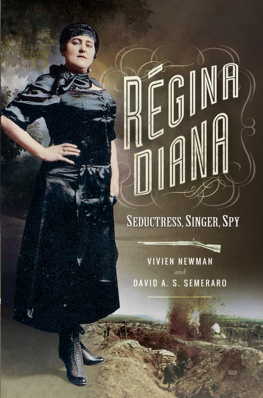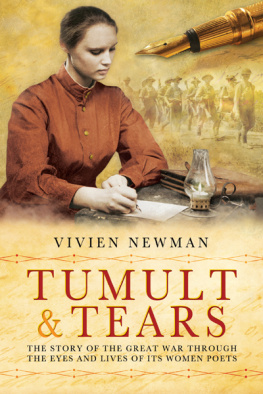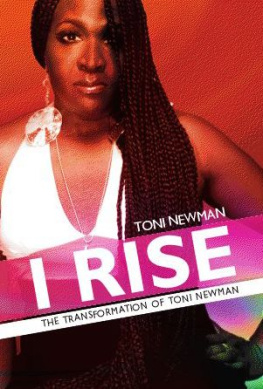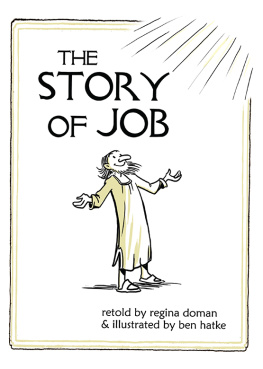Rgina Diana
Rgina Diana
Seductress, Singer, Spy
Vivien Newman
and
David Semeraro
First published in Great Britain in 2017 by
Pen & Sword History
an imprint of
Pen & Sword Books Ltd
47 Church Street
Barnsley
South Yorkshire
S70 2AS
Copyright Vivien Newman & David Semeraro, 2017
ISBN 978 1 47386 150 3
eISBN 978 1 47386 152 7
Mobi ISBN 978 147386 151 0
The right of Vivien Newman and David Semeraro to be identified as Authors of this work has been asserted by them in accordance with the Copyright, Designs and Patents Act 1988.
A CIP catalogue record for this book is available from the British Library.
All rights reserved. No part of this book may be reproduced or transmitted in any form or by any means, electronic or mechanical including photocopying, recording or by any information storage and retrieval system, without permission from the Publisher in writing.
Pen & Sword Books Ltd incorporates the Imprints of Pen & Sword Books Archaeology, Atlas, Aviation, Battleground, Discovery, Family History, History, Maritime, Military, Naval, Politics, Railways, Select, Transport, True Crime, Fiction, Frontline Books, Leo Cooper, Praetorian Press, Seaforth Publishing, Wharncliffe and White Owl.
For a complete list of Pen & Sword titles please contact
PEN & SWORD BOOKS LIMITED
47 Church Street, Barnsley, South Yorkshire, S70 2AS, England
E-mail:
Website: www.pen-and-sword.co.uk
(Vivien Newman)
This book is for my husband Ivan, constant companion, occasional devils advocate and always wise counsellor. He willingly ferried two lost souls around Kilometre 0 and patiently pointed out whether we were in 19141918 France, Germany or Switzerland. It is also for my sister Lucinda Semeraro whose enthusiasm for this project led her to embark not only on the 10km circuit Kilometre 0, but also to stay in the only area of France which is a food-free zone .
(David Semeraro)
This book is for my grandfather (Grandy) Earle Raymond Adler 19141994. It is my way of thanking him for the inexhaustible curiosity he instilled in me. It is also for my sons; may the passion of what you believe in, make you overcome all odds .
Contents
Acknowledgements (Vivien Newman)
Acknowledgements (David Semeraro)
Acknowledgements
(Vivien Newman)
F irst and foremost, my nephew and now co-author, David Semeraro. Without his insistence, I would have abandoned the quest for the Swiss singer Rgina Diane.
Once again, several friends have patiently listened to my ideas, thoughts and theories and allowed me to test these, and accept or finally reject them. In particular:
Professor Pam Cox who, years ago, made me realise that bad girls can be so much more interesting than good ones!
Keith Dolan, ever my Great War sounding block, this time for ideas and advice about Marseilles crucial role in troop transportation.
Warrant Officer Christopher Earl and his detailed information about shooting skills, positions, rounds per minute and accuracy.
Michaela Lamb, my spin class buddy, and Clare Russell, my power walking one, whose early interest in and enthusiasm for Rgina and her story never seemed to wane despite the hundreds of miles we must have covered since I (and they!) first heard of her.
Monique Serneels and Maria Weiss, my Swiss friends of many decades, my daughters godmothers and mothers of my goddaughters. Through them I learnt to love Switzerland and see beyond its cuckoo clocks, chocolate and pure mountain air. Also Dr Christiane Furrer, who so efficiently sourced articles via the University of Lausanne librarys e-resources when JSTOR let me down.
Last but by no means least, my daughters Rosalind and Elizabeth, who still indulge their funny mummy and always ask hows the book going? and, I think, listen to the reply.
(David Semeraro)
I would like to express my deepest appreciation to all those who have enabled me to complete this book.
Especial gratitude to:
My wife, for putting up with this mnage trois and for going along with this long-lasting and time-consuming obsession, and my boys, for putting up with a busy daddy.
Furthermore, I would also like to acknowledge and express appreciation for their crucial contributions to:
Gaspard Grass, Geneva, former History teacher now retired, who showed me how to access the Archives de Genve and bypass some of the paperwork.
Aurlien Grass, his son and my mate, Military Medic, Geneva, for his tolerance towards a somewhat distracted colleague.
Emmanuel Ducry, Archives de Genve, who graciously gave permission to use all the materials needed to complete our task.
A special thanks to Mlanie Fournier of the Department Fdral de lIntrieur, who helped me begin this journey down the murky paths of forgotten history.
Last but not least, many thanks go to the head of the project and co-author, Dr Vivien Newman, my aunt, who so innocently triggered my curiosity and sent me on this crazy crusade through murk and mystery, and for her drive in guiding me in achieving this goal.
And to any others who I may have forgotten to name, may they find here a sincere token of gratitude.
Both authors would like to express their gratitude to Karyn Burnham for her careful editing and useful comments. Any faults that remain are of course our own.
Chapter 1
Who WAS Rgina Diana?
M y first interest in Rgina Diana was sparked in early 2013. I was in the middle of writing We Also Served: The Forgotten Women of the First World War and was researching the spy Mata Hari. Flicking through the contemporary The War Illustrated , which gave subscribers a rather unbalanced view of the war as it unfolded, I noticed on 17 November 1917 a multi-photograph spread entitled Agents of Prussias World-Wide Espionage. Adjacent to the picture of Mata Hari the celebrated Hindu dancer, was another, equally grainy, image. The caption informed readers this was Rgina Diane [sic], a Swiss singer who had been condemned to death in France on being found guilty as a German spy. Having been brought up in the Swiss city of Lausanne, I was immediately intrigued. Despite my early love of history and interest in the Great War, I had never heard of a Swiss singer/spy. Who was she? A quick search of the internet would surely resolve this question or so I thought. Instead, a lengthy search produced two miniscule hits from an Australian newspaper site but beyond the supplementary information that Rgina Diana had been condemned to death at Marseille and had, by 7 January 1918, been shot, there was little to add to The War Illustrated one-sentence teaser.
Musing over this Marseille execution, I remembered having read the diary of Nursing Sister Burgess held at the Peter Liddle Archive. Referring to Marseille in December 1917, she had asserted, the town is full of spies and that sisters were only allowed out in twos or threes during the day or in fours or sixes at night. Having initially dismissed this as the spy fever that was prevalent throughout the war in England, France, Germany, and, as I would eventually discover, neutral Switzerland, I had thought little of it. But, was Sister Burgess maybe referring to Rgina Diana? Despite the press restrictions about reporting spying, was news of her trial and its verdict common knowledge in Marseille?










